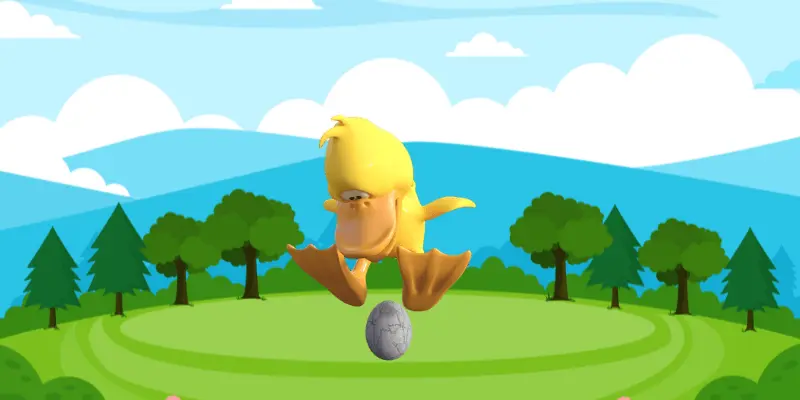When it comes to understanding the behaviors of ducks with their eggs, one might wonder, “Will ducks sit on unfertilized eggs?” From my personal experiences and deep dive into avian habits, it’s clear that ducks, much like chickens, can and often do sit on unfertilized eggs for an extended period of time.
They do this under the intentional belief that these eggs will eventually develop embryos and hatch into ducklings. However, without fertilization, these eggs will never produce ducklings.
In some cases, ducks may not realize they are sitting on unfertilized eggs and continue the incubation process much longer than the usual 28 days, waiting for ducklings that will never hatch.
This behavior is not only futile but can also lead to the eggs beginning to spoil, emitting an unpleasant odor and taste. It’s crucial for those raising ducks to ensure the freshness and quality of eggs that are intended to be consumed.
Unfertilized eggs, while still edible, should be consumed within a few weeks of laying to minimize the risk of contamination from harmful bacteria such as Salmonella.
Proper handling and storage are essential to ensure the eggs remain safe to eat. This involves keeping them at the correct temperature and away from contaminants.
Unlike fertilized eggs, which have the potential to develop into chicks or ducklings if incubated correctly, unfertilized eggs should be handled and stored properly to minimize the risk of contamination.
Will Ducks Sit on Unfertilized Eggs?
Ducks are remarkable creatures, known for their distinctive behaviors and tendency to sit on eggs, whether fertilized or unfertilized. This behavior has puzzled owners and farmers for years, leading many to wonder about the purpose behind it.
From the wild to the backyard, these resilient birds demonstrate an intricate and captivating adventure in egg incubation and hatching. The entire process of laying and caring for eggs is a meticulously prepared effort by the female duck, driven by the instinct to produce ducklings.
Yet, when it comes to unfertilized eggs, the question arises: do ducks realize these eggs will never hatch?
Ducks, much like many other species of waterfowl, rely on a strong instinct to incubate eggs in the hopes of hatching young. This process is successful only when eggs are fertile and have been properly incubated.

However, ducks do not have the ability to distinguish between fertilized and unfertilized eggs. They will sit on the eggs they have laid, incubated with the same care and hopes as if they were to hatch into ducklings.
This phenomena showcases the private and interesting facts about ducks, highlighting their resilient nature and thriving instincts, whether in the wild or in a backyard setting.
Ducks’ behaviors offer captivating insights into their lives, showcasing a meticulous preparation and care for their nests. Despite the issues that may prevent eggs from developing, such as not being fertilized, ducks continue to sit and incubate them.
This entire process is part of the intricate adventure of waterfowl laying and incubating eggs, a testament to their strong and resilient nature. As someone who has observed these interesting facts firsthand, it’s clear that ducks are creatures of habit and instinct, their actions often captivating those who manage their nests and care for them.
Anatomy of an Unfertilized Egg:
The anatomy of an unfertilized duck egg is complex, composed of several parts designed to potentially develop an embryo had it been fertilized. The outermost layer, or shell, is made of calcium carbonate, acting as a protective barrier for the developing life beneath.
A thin membrane, known as the inner shell membrane, provides additional protection for the delicate contents within.
The albumen, or egg white, contains nutrients, water, and protein to support growth, while the core, the yolk, is a nutrient-rich food source that remains intact and serves as nourishment for animals should the egg have been fertilized.
The Role of Fertilization in Incubation:
Fertilization is one of the most important factors in incubation, as only fertilized eggs have a higher chance of hatching. Ducks, like other birds, may still sit on unfertilized eggs, despite these eggs having no potential to develop into chicks.
The embryo inside a fertilized egg relies on the yolk for its growth and development, a process initiated when sperm from the male fertilizes the egg within the female’s body before laying.
Once laid, if the egg is fertilized, it has the potential to develop into a chick, distinguishing the critical role of fertilization in the incubation process.
Do Ducks Know If Their Eggs Are Fertile?
The question of whether ducks know if their eggs are fertile stirs a fascinating debate among researchers and bird enthusiasts alike.
While it’s clear that ducks cannot differentiate between fertilized and unfertilized eggs, or even those that are dead, they exhibit different behaviors that suggest a complex response to changes in their environment.
Ducks, particularly female ones, will usually continue sitting on their eggs with the conviction that ducklings will come, a behavior driven by a mother’s instinct. This instinct gets them used to the incubation process, which they start after laying all their eggs and usually lasts for the normal incubation time.
It’s both disappointing and remarkable how a broody duck gives so much care, warm and comfortable, to her eggs, incubating them in hopes of hatching, even without realizing the potential outcome.

The ability of ducks to tell if eggs will hatch may not be high, but they protect their nest instinctively, even from predators.
This sense to protect is rooted in their instincts, rather than an ability to detect fertility. After the drake and duck lay their eggs, the mother meticulously checks for cracks or damages, ensuring the nest is kept warm and comfortable.
In some cases, a duck might move on to start laying again or gives up on the incubation if she realizes, through her own instincts or changes she senses in her environment, that her current effort might not be successful.
This nuanced behavior suggests a deep-rooted instinct to continue the species, despite the disappointing reality that not all eggs will produce ducklings.
Why Would Duck Eggs Not Be Fertilized?
Several reasons contribute to why duck eggs might not be fertilized, ranging from genetics to environmental factors.
If ducks are not kept in close proximity to a compatible male duck, or if the mate is not successfully able to fertilize the egg with correct and properly penetrating sperm, the chances of having a fertile egg ready to hatch into a viable embryo or chick significantly decrease.
Environmental conditions also play a critical role; the place where the ducks mate and the eggs are kept must have the correct environment and temperature—neither too cold nor too warm—to support the development of a fertile egg.
Furthermore, age-related issues or infertility can affect both the male and female duck, with some breeds more prone to these issues than others.
It’s worth noting that even in the absence of a fertile egg, a duck may still sit on unfertilized eggs, driven by a strong instinct to nurture and protect what she hopes could become her future offspring.
| Other Ducks Behaviors to Know About: |
|---|
|
Do Ducks Have Ears? Can Ducks Move Their Eggs? Can You Potty Train a Duck? Do Ducks Eat Their Own Eggs? Do Ducks Eat Frogs? |
How Long Will a Duck Sit on Infertile Eggs?
A duck will often sit on infertile eggs for a longer period than the average incubation days, which is about 28 days, hoping they will eventually hatch.
This hatching period ranges because a duck, unable to distinguish between fertile and infertile eggs, will continue to incubate the eggs with the hope to produce ducklings.
Despite the dark reality that without fertilization—the union of the drake’s sperm with the ovum in the oviduct—no ducklings will emerge, ducks can store sperm in their storage tubules for weeks, which allows them to fertilize eggs days after mating.
However, if the eggs are not fertilized within a reasonable period, they will die, yet the duck continues to sit on them. It’s interesting to note that in rare cases, a duck may leave the nest to eat and drink, but quickly returns to brood, showing a strong maternal instinct even towards un-hatchable eggs.
Factors like improper temperature or humidity levels might reduce the chance of hatching, and if the duck does notice, it’s best to remove these eggs to prevent waste of energy and resources.
Do Ducks Know If Their Eggs Are Fertile?
The debate continues on whether ducks can tell if their eggs are fertilized. While there’s no high chance a mother duck can instinctively differentiate between fertilized and unfertilized eggs, they often sit on all eggs in their nest for weeks, beginning the incubation process as soon as the nest is laid.
This behavior may seem like a response to changes in their environment, suggesting some ability to detect factors we’re not fully aware of.
However, researchers believe ducks exhibit different behaviors to protect their eggs, whether fertile or infertile, from being eaten by predators.
Despite this protective instinct, it’s not easy for ducks to realize the normal incubation time has ended without hatching, yet they continue sitting, convinced that ducklings will come. This disappointing reality gets ducks used to a routine, making them broody even when success is not guaranteed.
| How Can You Tell If A Duck Egg Is Fertile Without Cracking It? |
|---|
|
Distinguishing between fertilized and unfertilized duck eggs is a challenging task without having to crack them open. It’s essential to know if an egg is fertile before incubating, especially when placing them under a mother duck. One of the easiest ways to check for fertility is by examining the shell surface; fertilized eggs usually have a dull and rough texture, while those non-fertile are more smooth. Another method involves candling, using a dark room and a flashlight. Place the light source near the egg and observe the contents carefully; blood vessels or an embryo forming within a few days are visible, indicating fertility. This important process requires one to handle the eggs with care, as movement can cause damage and reduce the chances of hatching. By shining a light through the eggshell to see inside, if you notice a heartbeat, the egg is likely fertile and has a good chance of producing a duckling. |
Conclusion:
While ducks may not differentiate between fertilized and unfertilized eggs, their instinct to incubate reflects a strong maternal drive. Despite the challenges in determining egg fertility without cracking them, methods like examining shell texture and candling offer insights into the potential for life within. Ultimately, the behaviors and practices surrounding duck egg incubation highlight both the complexity of avian reproductive strategies and the intricate relationship between environment, instinct, and the cycle of life.

